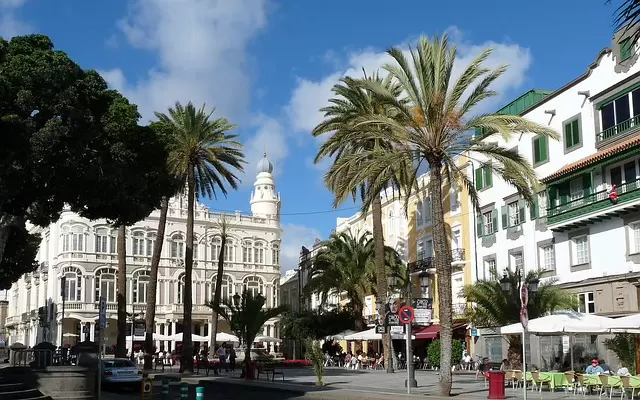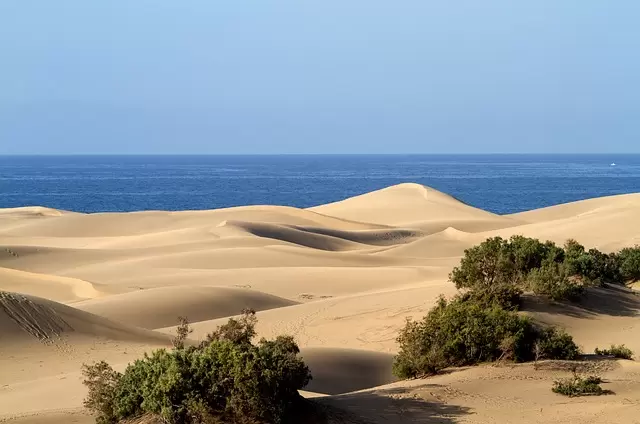
If you are interested in buying property in Gran Canaria, it is likely that you have visited the island - possibly on a number of occasions, and found the area to your liking. As with other Canary Islands, Gran Canaria is something of a marmite situation. This is natural since the island forms part of an archipelago distant from mainland Spain, and indeed, closer to Africa than Europe.
For those that appreciate the laid back way of life and the year-round temperate climate, there is much to like.
We begin by highlighting some of the more popular destinations, before considering the local property market, and some important legal considerations to bear in mind before investing in property in Gran Canaria.
For a more in-depth analysis of the conveyancing process, see our general article: buying property in Spain - which is equally applicable to the Canary Islands as it is to mainland Spain.
1. Popular Locations in Gran Canaria
The following locations have proven to be the most popular among visitors and property investors alike:

Las Palmas de Gran Canaria
Las Palmas de Gran Canaria, the capital city of the island, offers a blend of urban sophistication and natural beauty. The city boasts a rich cultural heritage, evident in its historic districts like Vegueta, and modern amenities, including top-notch healthcare and educational facilities.
Las Palmas is famous for its flourishing cultural scene, featuring numerous festivals, theatres, and galleries. The city also offers beautiful beaches, such as Playa de Las Canteras, known for its golden sands and clear waters. The busy port area adds to the city's cosmopolitan vibe.
According to the latest report by the Association of Spanish Land Registrars Property purchases in the capital city represent a relatively low percentage (22%) of all property conveyances in the province, most likely since the province of Las Palmas consists of the islands of Gran Canaria, Lanzarote and Fuerteventura.
This also reflects the fact that the Canary Islands is not typically associated with city life, and tends to attract those considering retirement in a relaxed environment in a temperate climate.
Pros
- Excellent amenities and infrastructure: Comprehensive services, including international schools, hospitals, and shopping centers.
- Strong expat community: A large and welcoming international community makes it easier for newcomers to integrate.
- Numerous cultural and recreational activities: Plenty of entertainment options, including museums, theaters, and sports facilities.
Cons
- Higher cost of living: Generally more expensive than other parts of the island.
- Traffic congestion: Can be problematic, especially during peak hours.
- Noise and hustle of city life: The vibrant urban atmosphere might not suit those seeking tranquillity.
Want to hear what other clients
are saying about us?

Maspalomas
Maspalomas, located on the southern coast of Gran Canaria, is renowned for its spectacular sand dunes, lush golf courses, and luxurious resorts. The area offers a laid-back lifestyle with a focus on leisure and relaxation.
Maspalomas Lighthouse and the nearby beach are iconic landmarks, while the town provides a range of high-end restaurants, shops, and recreational facilities.
The year-round warm climate makes it a popular destination for both tourists and expats seeking sun and sea. The local community is diverse, with many activities catering to international residents.
Pros
- Beautiful beaches and natural scenery: Famous for its dunes and scenic coastline.
- Wide range of leisure activities: Numerous golf courses, water parks, and outdoor pursuits.
- High-quality accommodation options: Abundance of luxury hotels and residential properties.
Cons
- High property prices: More expensive compared to other regions on the island.
- Crowded during tourist season: The influx of tourists can lead to crowded beaches and facilities.
- Limited cultural attractions: Fewer historical and cultural sites compared to the capital.
Puerto Rico
Puerto Rico, located in the southwest of Gran Canaria, is a popular resort town celebrated for its sunny weather, picturesque marina, and extensive range of water sports.
The town is designed with tourism in mind, offering a variety of bars, restaurants, and shopping centres. The sheltered beach and calm waters make it a favourite for families and water enthusiasts.
The town's layout on a hillside provides stunning views of the ocean. Despite its tourist-centric nature, Puerto Rico has a friendly and inclusive atmosphere, making it a comfortable place for expats to live.
Pros
- Warm, sunny climate year-round: Consistent sunshine and mild temperatures.
- Excellent for water sports and outdoor activities: Ideal for sailing, diving, and other marine activities.
- Friendly expat community: Welcoming environment for international residents.
Cons
- Tourist-centric: Can be very busy, especially during peak seasons.
- Limited cultural and historical sites: Primarily focused on tourism rather than heritage.
- Higher cost of dining and entertainment: Prices can be elevated due to the tourist demand.
Playa del Inglés
Playa del Inglés, situated on the southern coast of Gran Canaria, is one of the island's most popular resort areas. Known for its extensive sandy beaches, lively nightlife, and numerous shopping centers, Playa del Inglés attracts a diverse crowd, from young travellers to retirees.
The area offers a variety of entertainment options, including bars, clubs, and restaurants, making it a hub for social activities. The beach promenade is perfect for leisurely walks, while the nearby dunes of Maspalomas add a touch of natural beauty to the otherwise bustling environment.
Pros
- Vibrant nightlife and social scene: Plenty of options for entertainment and socializing.
- Extensive beaches and shopping facilities: Easy access to beaches and a wide range of shops.
- Variety of accommodation options: From budget-friendly apartments to luxurious hotels.
Cons
- Can be very busy and noisy: High tourist activity can lead to crowded and loud environments.
- Less suited for families seeking tranquility: The energetic atmosphere might not appeal to those seeking a quieter lifestyle.
- Higher prices during peak tourist seasons: Costs for accommodation and dining can increase significantly.
2. Planning Laws to Protect the Tourism Industry
Over the last decade, various laws have been brought in to protect the tourist industry in Gran Canaria - potentially to the detriment of the Gran Canaria property market. However, many of these laws did not have the impact hoped for, since in order to be effective, they required a level of investment that the tourism industry was not willing, or able, to make.
For this reason, it became necessary to overhaul the planning system to ensure that any new buildings constructed in areas designated as “touristic” would be restricted to use for this purpose. It was purely on this basis that such buildings received planning permission, and indeed, the most sought after or privileged areas were restricted to building for touristic use.
All of the above was contained in Law 2/2013 as modified by Law 9/2015, and which amongst other things, states, in Article 3(c): “Avoid, and where necessary correct any residential use of buildings in areas of touristic use.“
This is of considerable relevance to anyone planning on buying property in Gran Canaria.
3. New Modernisation Plan
The Town hall of San Bartolome De Tirajana is in the process of modernizing the entire area zoned for tourism (including Bahía Feliz, San Agustín, Playa Del Ingles, Maspalomas), but it has come across apartment buildings that are being used not for tourism purposes, but rather for long-term rentals (hotel employees, restaurants, mixed-business) or homes used by their owners.
There are buildings that require extensive refurbishment, and despite the laws that have been approved to improve these touristic areas, the result is one that was not expected. Despite the fact that Law 17/1967 does not establish that the use of Gran Canaria property can be affected by future planning regulations and that those buildings that were constructed before 1996 were not subject to any restriction for use as residential properties.
Law 2/2013, Article 75(12) renders as a serious infraction, “use for residential purposes and therefore non-compliance with a planning restriction that designates an area as for touristic use solely”.
4. Buying Property in Gran Canaria: sanctions
Upon failure to comply with the established use intended by the original planning approval, Gran Canaria property owners may be sanctioned to the extent permitted by Law 2/2013 and, where the planning approval permitted mixed residential and touristic use, such owners may be required to adapt their facilities in order to comply with the building quality standards that reach an excellent and eco-efficient level, as proposed under the legislation.
The preamble to Law 9/2015 expresses it as follows:
”the necessity that the planning process promotes the correction of the process of conversion to residential use in touristic zones, on the one hand, declaring the requirement to adjust to touristic use, being the use that the planning approval was originally conferred to many buildings, that have converted in practice, and without authorisation, to residential complexes: and on the other hand, establishing the criteria by which the most optimal and privileged zones are restricted to touristic use, additionally regulating supposed compatibility exceptions, permitting and facilitating the reconversion of specific residential buildings, with due authorisation, into villas or any other tourism product that will enhance those specific destinations."
As a result, all those who are not in agreement with the content of the new Planning Guidelines and who consider that their rights are infringed by the approval of the new Urban Plan, should present their allegations at the PGOU, before September 30th, 2015.
5. Conclusion
This is the current situation and we will see how matters progress after the ‘public hearings’ phase. However, the Town Hall has stated that Gran Canaria property owners should not be alarmed, that they do not wish to take anything away from private owners, though the plan is approved and nothing can be ruled out.
That said, they are required to apply the law, and if a complaint is received by a Tourist Operator, they would be obliged to act. If planning on buying property in Spain, and Gran Canaria in particular, great care should be taken, and legal advice sought before handing over any money to estate agents or vendors.
Want to hear what other clients
are saying about us?
6. Frequently Asked Questions
Can foreigners buy property in Gran Canaria?
Yes, foreigners can buy property in Gran Canaria. As a non-resident, you must obtain a NIE number (Número de Identificación de Extranjero), which is a personal identification number required for property transactions. You can apply for this number at the Spanish Embassy in your home country or at a police station in Spain. Additionally, ensure you have legal assistance to navigate the buying process, including contracts and due diligence.
What are the disadvantages of buying a property in Spain?
Buying property in Spain has several potential disadvantages. These include complex legal procedures that require thorough due diligence, potential language barriers necessitating local legal assistance, and fluctuating property market conditions. Additionally, buyers may face unexpected taxes and fees, as well as challenges related to property maintenance and local regulations.
Which Canary Island is best to buy property?
Tenerife is the largest and most accessible of the Canary Islands, with regular flights from most UK airports, making it an ideal option for a second home. Tenerife also offers significant rental potential, making it a top choice for property investors. Gran Canaria is another excellent option, known for its diverse landscapes, vibrant culture, and well-developed infrastructure. It provides a great balance of leisure and lifestyle, attracting many expats and tourists.
Is it a good time to buy property in Canary Islands?
Despite global uncertainties and economic challenges, the Canary Islands remain a popular destination for property buyers. According to the latest data, property prices in the Canary Islands increased by 6.7% year-on-year in Q1 2024, reflecting strong demand. This suggests that it is still a good time to consider buying property in the Canary Islands, as prices are continuing to rise moderately.









